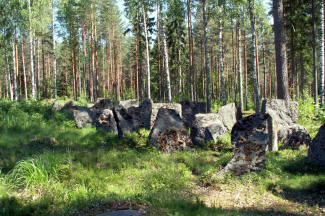)
January 9, 2012
 We
have pointed out that it is we ourselves who are the greatest
obstacle to a deeper and fuller presence to ourselves, others,
and God. There are as many strategies of evasion of personal
presence as there are persons. It is important that we become
aware of what it is in us, under the differing circumstances of
our lives, that prompts us to cling to, act out of, or seek
compensatory behaviors at the expense of the ultimately more
satisfying response of simply being present .
We
have pointed out that it is we ourselves who are the greatest
obstacle to a deeper and fuller presence to ourselves, others,
and God. There are as many strategies of evasion of personal
presence as there are persons. It is important that we become
aware of what it is in us, under the differing circumstances of
our lives, that prompts us to cling to, act out of, or seek
compensatory behaviors at the expense of the ultimately more
satisfying response of simply being present .
Examples of how
our habitual patterns of behavior might inhibit our capacity for
simple presence might include the following:
-
A desire to solve problems quickly as they
arise in the situation leads to immediate action
irrespective of other manifestations or movements in one’s
field of experience. Taking care of the problem now may
suspend one’s attention and listening to the larger field
and those aspects of it that are seemingly unrelated to the
immediate problem.
-
A tendency toward “project-exaltation”
that sees only
one’s chosen involvements to the exclusion of other needs
and the demands made on other persons.
Here it is absorption rather than presence that
rules.
-
An over concern for good preparation and
order that causes one to put off being present now until
everything has been taken care of and provided for. Putting
Mary off, if you will, until Martha is perfectly satisfied
and prepared.
-
Only inadvertently and occasionally
opening up one’s “horizon” to the transcendent dimension, to
the “more than” in life. Not infrequently as we age some
will offer the comment: “We’re getting older, you know.”
Most often, however, this is not the prelude to a
conversation about the experience but a comment that is
immediately dropped. This may well be due to the anxiety
that the topic evokes in us.
Deepening our capacity for presence
requires of us an ever-increasing self-awareness of the contours
of our habitual patterns of presence-avoidance complemented by a
process of self-formation. This process presumes a willingness
to take our formation seriously, to make the quality of our
presence a matter of central concern in our lives.
In The Art of
Existential Counseling, Adrian van Kaam describes the
arduous process of formation that is required if we are to move
beyond our habituated modes of existence .
In the long, sometimes tedious process of
psychotherapy, clients experience that an unwholesome mode of
existence is usually formed by an accumulation of experiences
over a long period of time. They realize gradually and slowly
that the manifold experiences which built this unsavory mode of
being were not worked through at the moment that they were introjected; they were not freely and wisely appropriated. The
clients now see, in the process of therapy itself, that not only
the insight into the complex structure of a mode of existence,
but also the slow and painful growth beyond this mode, requires
an arduous and patient dialogue with the myriad manifestations
of this mode in innumerable concrete life situations.
[Spiritual Formation] is the development of the ability for
persevering dialogue with the disclosures of one’s existence in
daily life. One of the long-range aims of psychotherapy,
therefore, is to prepare the client to be patiently present to
him or herself as manifested in his or her life situation. This
art often remains unlearned in our technological society. (p.
175)
Van Kaam points
out here that our unwholesome habituated modes of existence are
formed by “an accumulation of experiences over a long period of
time.” We know that we all carry wounds from our early
formation, before we were able to process and work through the
effects of these experiences on our emerging life form. This is
why van Kaam advises us “to listen to the message that every
pain conceals.” (Traditional Formation, p. 175) Our
attentiveness to our experience of formation is a power of
restoration. It requires, as the passage indicates, “patient
dialogue with the myriad manifestations of... [our deformative
modes] in innumerable life situations.” The disclosures occur
in our current life situation; we need only attend. This
formative approach to our life prepares us for presence. As van
Kaam says, we are to be “patiently present to ourselves in our
life situation.”